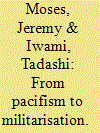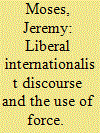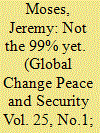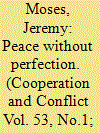| Srl | Item |
| 1 |
ID:
086622


|
|
|
|
|
| Publication |
2009.
|
| Summary/Abstract |
The pacifist commitment contained in Article 9 of the Japanese constitution has long been a source of scholarly interest and debate. While the insertion of the clause in the post-Second World War constitution was originally justified by General MacArthur (amongst others) as an expression of the 'high ideals' of liberalism and democracy that Japan was now embracing, it has since been derided as an impediment to effective Japanese participation in wars fought by the United States that are claimed to be in defence of freedom and democracy. This reversal of liberal logic became evident in the early years of the Cold War as Japan was encouraged to support the US in the Korean War and has strengthened in the years since. From the first Gulf War of 1991, up to the current War on Terror, much has been made of the constraints that Japan faces in supporting the 'defence of freedom' on a global scale. This paper aims to show the place of liberal discourses in relation to the pacifist clause in order to highlight the great ambiguity and inconsistency that exists in liberal claims concerning the promotion of peace in international affairs. In the context of tensions over Taiwan and North Korea, as well as the potential for controversial 'humanitarian' roles for the Japanese military in the South Pacific, these normative questions aim to shed light on the potential dangers of Japanese remilitarisation on liberal-internationalist grounds.
|
|
|
|
|
|
|
|
|
|
|
|
|
|
|
|
| 2 |
ID:
098462


|
|
|
|
|
| Publication |
2010.
|
| Summary/Abstract |
This article analyses the liberal internationalist discourses that drew together the foreign policies of Tony Blair and George W. Bush. While it is clear that the two former leaders maintained a deep and abiding commitment to the spread of freedom and democracy to all corners of the world, very little work has been carried out to explain how these shared values related to their exercise of an aggressive foreign policy and, perhaps more importantly, what this can tell us about some of the most persistent undercurrents of liberal foreign policy practice. This article begins by illustrating the 'liberalisms' of both Blair and Bush before examining the place of globalisation, humanitarianism and democracy in their respective foreign policy doctrines. It then briefly examines whether these themes may continue under the Obama presidency. Finally, the international and domestic consequences of this form of liberal internationalism are raised. The article concludes with the claim that a failure to recognise and understand the inevitable violence generated in pursuit of unquestioned liberal values will lead those who follow Bush and Blair toward the same excessive use of force that has characterised the war on terror.
|
|
|
|
|
|
|
|
|
|
|
|
|
|
|
|
| 3 |
ID:
118026


|
|
|
|
|
| Publication |
2013.
|
| Summary/Abstract |
In September of 2000, I took part in the 'S11' protests in Melbourne during the World Economic Forum (WEF). Following in the wake of the 'Battle in Seattle' protests the preceding year, S11 was understood as a continuation of the push by 'the people' against the anonymous and destructive forces of global finance, underpinned by principles of neo-liberal globalization. I recall with particular clarity the events of one night during the WEF when, heading back to our motel after a long day of festivities and confrontations, we saw a rush of people toward one of the entries to the Crown Casino. It soon became apparent that some forum participants were either coming or going at this time and this became one of many flashpoints for conflict between protestors and police. Taking my place face to face with riot police and the horses on which some of them were mounted, the situation quickly intensified. There was a certain buzz to be had from facing off with police in this way; coming face to face with the visible face of sovereignty and screaming abuse at it. It was a moment in which we thought we knew what it was like to see through the mask of liberal democracy and experience the reality of a police state.
|
|
|
|
|
|
|
|
|
|
|
|
|
|
|
|
| 4 |
ID:
157797


|
|
|
|
|
| Summary/Abstract |
It is common in international relations thought to view realism and pacifism as lying at opposite ends of a spectrum on the permissibility of war. Pacifism, from this point of view, is necessarily antithetically opposed to and incompatible with realist thinking on the use of force. This article aims to counter this view and raise some critical questions concerning the incompatibilities of realism and pacifism through an examination of some points at which they may be seen to intersect. In pursuing these intersections, the first part of the article sets out the foundations of classical realist thought, focusing on the inherently conflictual depiction of human nature as the basis for a theory that insists upon the inescapable possibility of political violence. It then departs from the conventional narrative by setting out the intersections of pacifist and realist thought concerning the illogical and dangerous attempts to moralise war-fighting through the application of just war theory. Finally, it is proposed that a synthesis of some elements of pacifist and realist thought could lead to the development of new theories and strategies attuned to the promotion of non-violence in an inherently unstable and conflict-prone world.
|
|
|
|
|
|
|
|
|
|
|
|
|
|
|
|